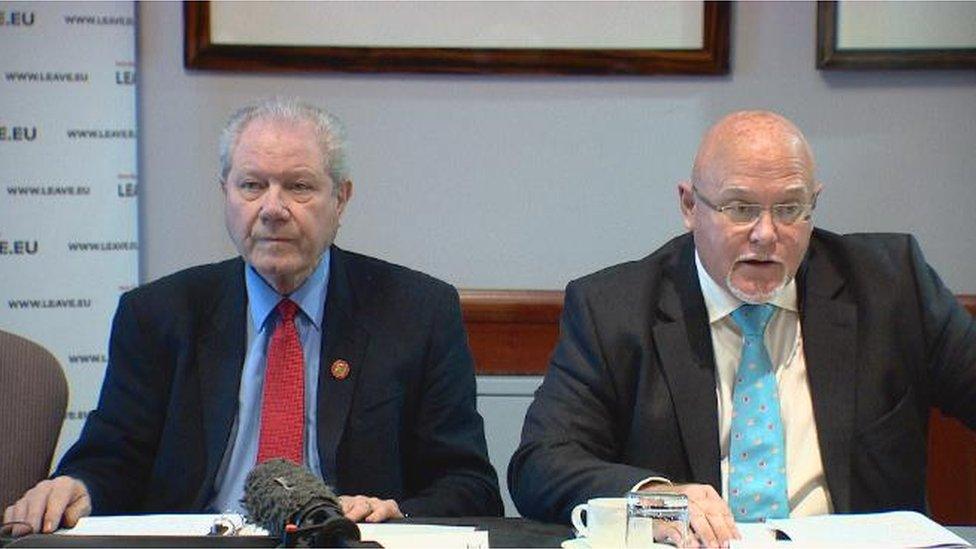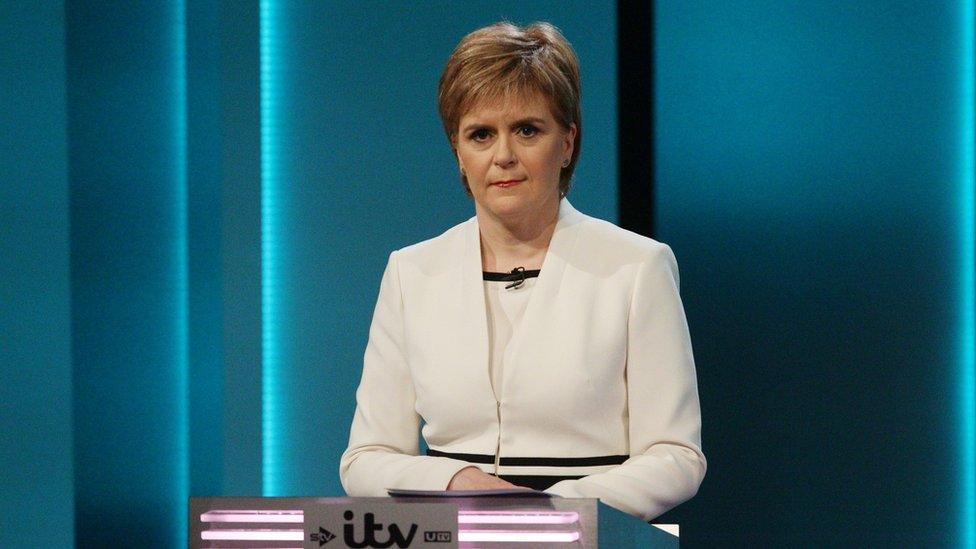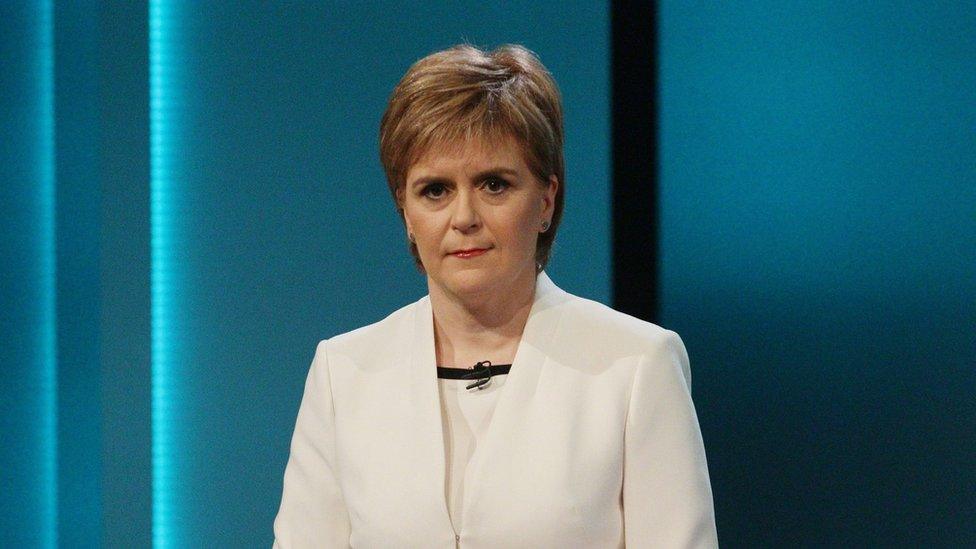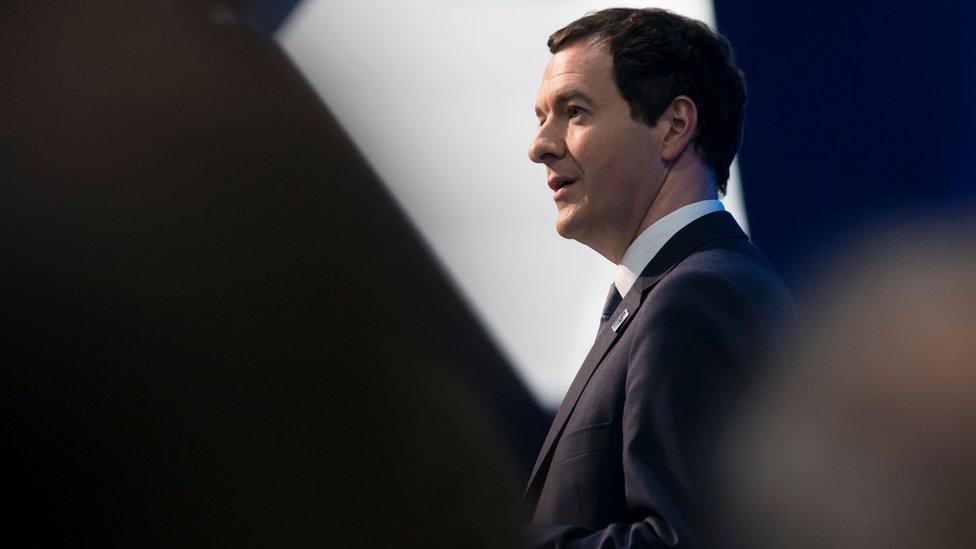Strange liaisons in the EU referendum campaigns
- Published

Intriguing times, strange liaisons. Driven by a test of voters' views which is, lest we forget, a referendum, not an election designed to disclose partisan allegiances.
Alistair Darling smiles benignly as the Chancellor, George Osborne, warns of an emergency budget - with tax hikes and spending cuts - in the event of Brexit.
Mr Darling was not explicitly endorsing the Chancellor's medicine - but he was backing the diagnosis, based upon forecasts from the IFS and others, to the effect that the UK economy would nosedive by at least £20bn in the event of leaving the EU.
In response to which, some Tory backbenchers - nominally still on the Chancellor's side - advise their colleague to stop talking nonsense. One anonymously suggests that the men in white coats will be coming for Gideon in the event of Brexit.
In Edinburgh, meanwhile, a Nationalist on the Left, Jim Sillars, joins Brian Monteith, a former Tory MSP on the Right, at a news conference to advocate Leave.
Mr Sillars, as ever, pursues his own distinctive economic and social arguments. Mr Monteith - who ran the Think Twice campaign against devolution in 1997 - argues that Brexit could result in extra powers for Holyrood. He has the grace to accompany this with a wry smile.
Both their arguments, needless to say, are countered by Remain campaigners.

Jim Sillars and Brian Monteith found themselves side by side for Brexit
Over at the Scottish Parliament, spin doctors from sundry parties can be seen chatting to each other. Perhaps preparing the ground for tomorrow's event when party leaders will coalesce to back Remain.
Strange days, curious liaisons. The strains inside the Conservative Party are all too volubly evident. But consider Labour. Their chat is that reports from proletarian areas, notably in England, suggest a decided propensity to vote Leave.
That is prompting anxiety for two reasons. One, the basic point that it bolsters the prospect of Britain quitting the EU - which the party's leadership, we are assured, opposes.
Two, it might suggest that Labour has lost touch with what, in England, we can still describe as its grassroots. (Those have long since been painted SNP yellow in Scotland.)
As one senior Labour insider put it to me, the party has resolutely disdained the issue of immigration - and fretting voters are now responding.
SNP voters
Consider too the SNP. It is possible, indeed probable, that substantial numbers of SNP supporters are thinking of voting Leave.
Some because they dislike the EU. Some because they believe that disruption to the body politic in these islands is a potential gain for the SNP which seeks to end that other Union, the United Kingdom.
Some because they want to give David Cameron and George Osborne a kicking, remembering the original Project Fear which undermined the SNP case in September 2014.

Nicola Sturgeon has sought to characterise the Leave campaign as being a right-wing Tory manoeuvre
Nicola Sturgeon is seeking to counter all these tendencies. How? By a collaborative, co-operative approach? Well, not quite. Rather, she proceeds by suggesting that Brexit would lead to a more right-wing Conservative government - with, she argues, dire consequences for Scotland in the form of cuts to spending, jobs and workers' rights.
Why defend the EU by attacking the Tory right? Again, this is dog whistle politics. Ms Sturgeon calculates that it is up to Messrs Cameron and Osborne to deal with Tory supporters. (Or, perhaps, she takes the still more pessimistic view, from her standpoint, that Tories are largely lost to the Remain camp anyway.)
Either way, she is seeking to shore up the remaining Remain vote - by appealing directly to those who intuitively dislike the Tories and suspect their motives.
In essence, she is saying to her chums: you don't like George Osborne, guess what, I don't like him either - but this is about the entire future of Scotland and the UK in the European Union, not an anti-Tory protest.
Scottish independence
But how about that other referendum? How about the possibility of indyref2 in the event of Brexit against Scotland's declared will?
Here, Ms Sturgeon is in a bit of a bind. She cannot absolutely rule out such a plebiscite. It would infuriate her party.
Equally, I do not discern any evident enthusiasm among Team Sturgeon, among the broader SNP leadership, for holding an early poll on independence.
For one thing, as stated here endlessly, Nicola Sturgeon does not want to hold a referendum on independence. She wants to win one - and fears that a second defeat could push back her party's prospectus immeasurably.
Secondly, there are SNP strategists who believe that Brexit could be a problem for independence - not an opportunity.
They calculate that SNP-style independence is founded upon an appeal to Scottish self-belief. Unlike some independence movements elsewhere, Scots are not being invited to flee tyranny. Rather, they are being encouraged to take control of their own nation, with confidence.
In this scenario, it is argued that Brexit - and the potentially difficult negotiations for departure which would be required - run counter to a sense of stability, a sense of confidence. In short, that Brexit would be unsettling enough without proposing independence on top.
Strange times, strange politics.
- Published15 June 2016

- Published15 June 2016
